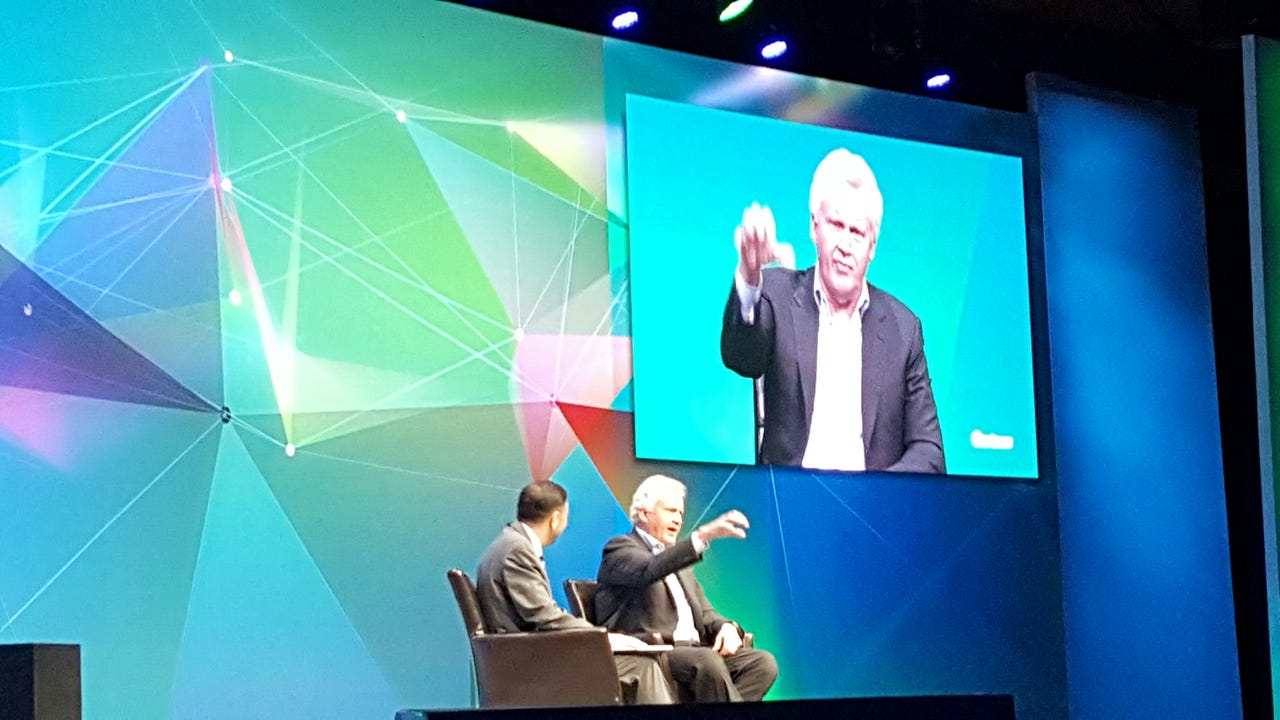GE's Immelt on software strategy: 'Why not us?'


ORLANDO--General Electric CEO Jeffrey Immelt made his pitch to chief information officers as a technology partner and software vendor that is aiming directly at the Internet of things and IBM.
Gartner Symposium
Immelt's talk at the Gartner Symposium ITxpo comes at an interesting time for GE. The company recently outlined its ambition to be a leading Internet of things platform player. The goal: Become a top 10 software vendor by 2020.
"The digitization of this industrial company is the biggest shift I've been involved with," said Immelt, who noted he was at the conference to recruit technology talent as well as learn.
The GE leader's first mission was to convince a bevy of CIOs that the company could be a technology provider for their digital business efforts. GE is highlighting how every company is becoming one that revolves around technology. Consider:
- GE CEO makes case for industrial Internet, analytics opportunities
- GE unveils Digital Power Plant in anticipation of greater energy demands
- GE forms GE Digital, aims to be top 10 software company
- GE unveils Predix Cloud for industrial data, analytics
"We'd like to be one of the companies that does both platform and applications," said Immelt. "I want us to be at the forefront of achieving industrial outcomes. I want to be at the intersection of physical and analytical information. You have to be great at software. We want to be fast."
Immelt noted that GE, the digital industrial company, will use analytics as a bridge for its platform and applications. "We can provide a better analytic cloud than anyone else can. Why? We know your industrial businesses better," said Immelt.
Sound familiar? Immelt's talk rhymed with IBM CEO Ginny Rometty earlier in the day. Both talked about science knowhow and driving outcomes for businesses.
Immelt talked about GE's journey from being a company that was a "knuckle dragging industrial company" that outsourced technology and IT. Software was the backbone of the company, but initially chose to outsource most of its development and IT.
"Then we woke up one day and realized we had to change," said Immelt. "If you go to bed tonight as an industrial company, you're going to wake up a software company. The world changed. If we followed that same strategy something bad was going to happen."
Can GE make the technology turn? Immelt quipped that if GE couldn't get analytics right and move toward an IoT strategy, Thomas Edison would come back and beat him. "Why not us?" asked Immelt.
Immelt said that GE will grow its software business via organic growth with some acquisitions. "If you're trying to pivot you don't know what you don't know about technology acquisitions," said Immelt, who noted that there has been more value destroyed by software mergers and acquisitions.
He added that GE Software is building its foundation of technology and talent before pondering acquisitions. Immelt argued that GE's industrial knowhow will set it apart from horizontal software providers such as IBM, SAP and Oracle. "We plan on being horizontal and vertical," he said.
To Immelt, things like locomotives are basically going to be rolling data centers with the data that will be crunched to achieve business goals. Predix will be the platform for these industrial assets, he said. He said that a railroad CEO isn't going to want to hear about the Internet of things, but velocity and how efficiency of that locomotive will improve his bottom line.
GE will also put skin in the game with its customers to improve operational metrics with its technology, said Immelt.
A few observations about Immelt's talk:
- Immelt used real world metrics that GE's industrial customers care about. That knowledge alone will get GE software deals. Simply put, GE will be able to get into the weeds about what it calls the industrial Internet without sounding pitchy. Traditional tech rivals will have to bone up with consultants to project that knowledge.
- He was very clear about GE Software's aspiration to provide platforms as well as driving operations for its customers. "We made the investment, reallocated resources and are playing to win," said Immelt. "
- Immelt was a bit folksy and came off as humble with where GE stands today. He said he will partner as well as build internally. When asked about where the lines will be drawn between GE's turf in aviation, transportation and healthcare and customers and rivals, he noted that he wasn't that smart to make predictions.
- GE's take is that productivity can be improved via technology and analytics. "What role have we played in this ecosystem to make productivity really take off?" asked Immelt, who said it's disappointing that efficiency hasn't improved dramatically in years.
- There was a real focus on the enterprise and Immelt saw the smart home as a market that is too crowded to drive returns for GE. GE has been divesting its consumer-focused businesses.